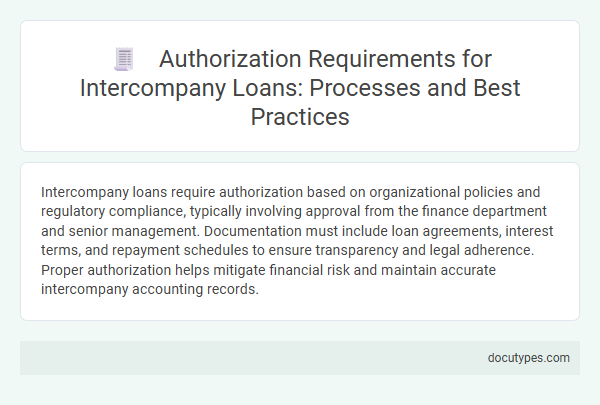Intercompany loans require authorization based on organizational policies and regulatory compliance, typically involving approval from the finance department and senior management. Documentation must include loan agreements, interest terms, and repayment schedules to ensure transparency and legal adherence. Proper authorization helps mitigate financial risk and maintain accurate intercompany accounting records.
Introduction to Intercompany Loan Authorization
Intercompany loan authorization is a critical control process within corporate finance, ensuring compliance with regulatory requirements and internal policies. Proper authorization mitigates risks related to financial mismanagement, tax implications, and legal liabilities across different subsidiaries. Understanding the specific authorization needed helps maintain transparency and accountability in corporate lending transactions.
Key Regulatory Frameworks Governing Intercompany Loans
| Authorization Type | Key Regulatory Framework | Description | Relevant Authority |
|---|---|---|---|
| Internal Corporate Approval | Corporate Governance Policies | Approval from the board of directors or designated internal committee is mandatory to comply with internal risk management and oversight. | Company Board or Audit Committee |
| Regulatory Notification or Approval | Financial Regulatory Authorities (e.g., SEC, FCA) | Some jurisdictions require prior notification or approval when intercompany loans exceed specified thresholds to ensure transparency and prevent misuse. | Securities and Exchange Commission, Financial Conduct Authority |
| Central Bank Authorization | Foreign Exchange and Cross-Border Lending Regulations | Central banks monitor cross-border intercompany loans to regulate foreign currency exposure and capital flows, often requiring authorization or reporting. | Central Banks (e.g., Federal Reserve, European Central Bank) |
| Tax Authority Approval | Transfer Pricing and Tax Compliance Laws | Intercompany loans must comply with transfer pricing regulations to avoid tax evasion, often requiring documentation and approval from tax authorities. | Internal Revenue Service, HMRC |
| Antitrust and Competition Review | Competition Laws | In some cases, large intercompany loans may be reviewed to ensure they do not violate antitrust or fair competition laws. | Federal Trade Commission, Competition Commission |
| Legal Compliance Check | National Corporate and Lending Laws | Loans must comply with country-specific corporate laws, including documentation and contractual requirements to ensure enforceability. | Local Regulatory Bodies |
You must ensure that all necessary authorizations are obtained under these key regulatory frameworks before proceeding with intercompany loans to maintain compliance and mitigate legal risks.
Essential Documentation for Loan Approval
Authorization for intercompany loans requires specific approvals to comply with corporate governance and regulatory standards. Essential documentation must be provided to secure formal loan approval and avoid legal complications.
- Board Resolution - Official approval from the lending and borrowing entities' boards is mandatory for authorization.
- Loan Agreement - A detailed contract outlining terms, interest rates, repayment schedules, and conditions is essential.
- Financial Statements - Up-to-date financial records of both parties help assess creditworthiness and risk.
Your intercompany loan approval depends on accurately preparing and submitting these core documents for review.
Internal Policies and Stakeholder Roles
Authorization for intercompany loans typically requires approval according to your organization's internal policies, ensuring compliance with corporate governance and financial regulations. Key stakeholders involved include the finance department, legal team, and senior management, each playing a role in reviewing loan terms, risk assessment, and adherence to transfer pricing rules. Proper documentation and recorded approvals maintain transparency and accountability throughout the intercompany loan process.
Step-by-Step Authorization Process
Authorization for intercompany loans involves a structured approval process to ensure compliance with corporate governance and legal requirements. Each step must be carefully documented to maintain transparency and accountability throughout the transaction.
- Initial Request Submission - The borrowing entity submits a formal loan request detailing the amount, purpose, and repayment terms.
- Review by Finance Department - The finance team evaluates the request for financial viability and risk assessment.
- Approval by Senior Management - Senior executives review the loan proposal and authorize it based on company policies and strategic alignment.
- Legal and Compliance Check - Legal counsel verifies adherence to regulatory requirements and intercompany agreements.
- Final Authorization and Documentation - Authorized signatures are obtained, and official loan agreements are executed to formalize the transaction.
Risk Assessment and Due Diligence Procedures
Authorization for intercompany loans requires a comprehensive risk assessment to evaluate creditworthiness and potential financial exposure. Proper due diligence procedures must be in place to verify regulatory compliance and internal policy adherence.
Risk assessment includes analyzing the borrowing entity's financial stability and the impact on consolidated financial statements. Due diligence involves reviewing legal documentation and ensuring alignment with transfer pricing rules and relevant jurisdictional regulations.
Compliance Requirements and Audit Trails
Which authorization is required for intercompany loans to ensure compliance requirements are met? Obtaining formal approval from the finance and legal departments is essential to align with regulatory standards and internal policies. Audit trails must be maintained meticulously to document the authorization process and guarantee transparency during financial reviews.
Approval Workflow and Escalation Protocols
Authorization for intercompany loans typically requires formal approval from designated financial officers or a corporate governance committee. The approval workflow involves multiple layers of review to ensure compliance with internal policies and regulatory standards.
Your workflow should include initial assessment by the finance team, followed by validation from the legal department, and final approval from senior management. Escalation protocols are essential for handling exceptions or disputes, ensuring timely resolution by escalating issues to higher authority levels. Clear documentation of each approval stage maintains transparency and accountability throughout the process.
Common Challenges and Mitigation Strategies
Authorization for intercompany loans typically requires approval from both the lending and borrowing entities' senior management, along with compliance checks from the finance and legal departments. Regulatory frameworks such as transfer pricing rules and local tax laws also mandate specific documentation and authorization levels to ensure transparency and avoid tax risks.
Common challenges include aligning approval processes across different jurisdictions, managing currency risk, and maintaining accurate documentation to satisfy auditors and regulators. Implementing centralized approval systems and regular cross-departmental audits helps mitigate these risks and ensures compliance with internal policies and external regulations.
Which Authorization Is Required for Intercompany Loans? Infographic

